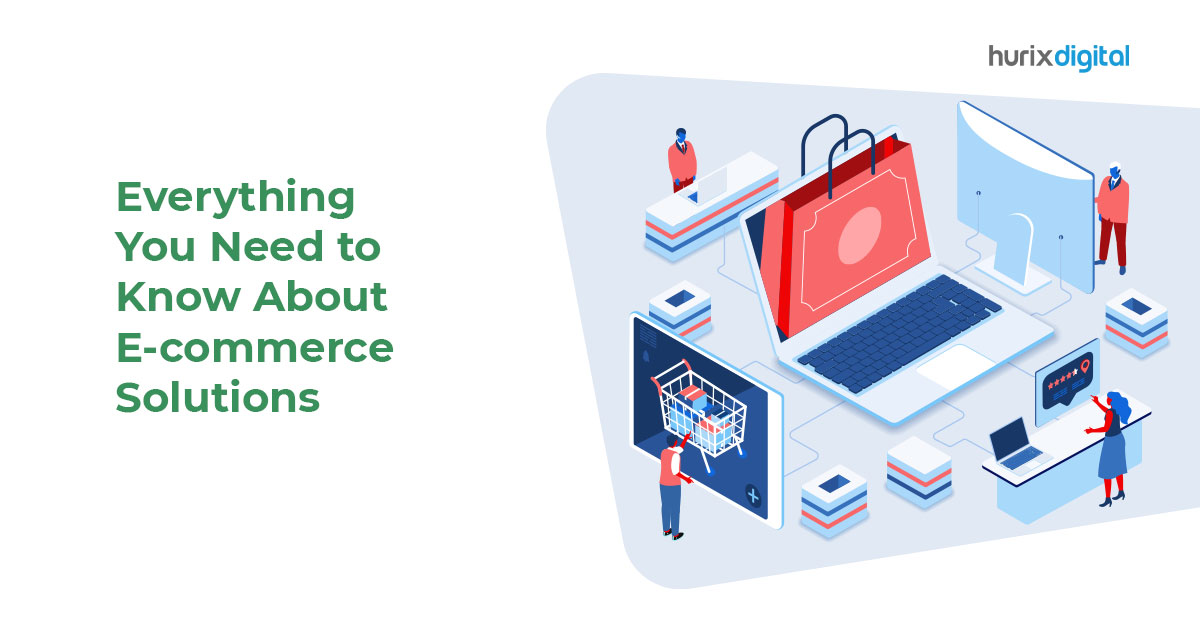E-commerce solutions are crucial for modern businesses. They help manage online stores efficiently.
In today’s digital age, having an e-commerce solution is essential. Whether you run a small shop or a large enterprise, the right e-commerce solution can streamline your operations. It can handle inventory, process payments, and enhance customer experience. With the rise of online shopping, businesses need to stay competitive.
An effective e-commerce solution can provide that edge. It helps in automating tasks, reducing errors, and saving time. This blog will explore the importance of e-commerce solutions. We’ll discuss how they can benefit your business and improve your sales. Stay tuned to learn how to choose the best solution for your needs.

Credit: unlimitedexposure.com
Introduction To E-commerce Solutions
Explore the world of e-commerce solutions. These tools help businesses sell products online. They streamline operations, boost sales, and enhance customer experience.
E-commerce solutions help businesses sell products online. They provide tools for creating and managing online stores. These solutions simplify inventory management, payment processing, and customer service. Using the right e-commerce solution can enhance a business’s efficiency and reach.Evolution Of Online Business
Online business has grown rapidly. In the early days, websites were basic. They provided limited information. Over time, technology improved. Websites became more interactive. E-commerce platforms emerged. These platforms made online selling easier. Businesses could reach a global audience. Today, e-commerce is a key part of many businesses.Importance Of E-commerce Solutions
E-commerce solutions offer many benefits. They streamline operations. Businesses can manage inventory and sales in one place. This saves time and reduces errors. E-commerce solutions also provide secure payment options. Customers feel safe making purchases. Good e-commerce solutions improve customer experience. They offer easy navigation and quick checkouts. Happy customers are more likely to return. E-commerce solutions help with marketing. They offer tools for SEO and social media. Businesses can attract more visitors. Analytics tools provide insights. Businesses can understand customer behavior and improve their strategies. In short, e-commerce solutions are essential for online success. “`Key Features Of Modern E-commerce Platforms
In today’s digital age, modern e-commerce platforms come with a plethora of features designed to enhance the shopping experience. These platforms are built to provide ease of use, security, and efficiency, ensuring both businesses and customers benefit. Below, we’ll explore some of the key features that make modern e-commerce platforms indispensable.
User-friendly Interface
A user-friendly interface is crucial for any e-commerce platform. It ensures that users can navigate the site effortlessly. Key elements of a user-friendly interface include:
- Intuitive Design: The layout should be clean and easy to understand.
- Responsive Design: The site must work well on all devices, including smartphones and tablets.
- Simple Navigation: Users should find products and information quickly.
An effective interface keeps customers engaged and reduces bounce rates.
Secure Payment Gateways
Security is a top priority for e-commerce platforms. Secure payment gateways ensure that transactions are safe and reliable. Key features include:
- Encryption: Protects sensitive data during transactions.
- PCI Compliance: Adherence to standards set by the Payment Card Industry.
- Multiple Payment Options: Support for credit cards, PayPal, and other methods.
Secure payment gateways build trust and encourage repeat purchases.
Personalized Shopping Experience
In the world of e-commerce, a personalized shopping experience is key. Customers want to feel understood and valued. Tailoring the shopping journey to individual needs can greatly enhance satisfaction.
Customer Segmentation
Customer segmentation divides your audience into smaller groups. These groups share common characteristics. Age, location, and shopping behavior are some examples. This helps in creating targeted marketing strategies. Knowing your customers better improves their shopping experience.
Ai-powered Recommendations
AI-powered recommendations make the shopping experience unique. These systems analyze customer behavior and preferences. They suggest products that match individual tastes. This not only increases sales but also customer satisfaction. Personalized product suggestions make the shopping process smoother and more enjoyable.

Credit: www.sana-commerce.com
Integrating Social Media
Integrating social media into your e-commerce strategy can boost your online store. Social media platforms are powerful tools. They help you reach a wider audience. They also create opportunities for direct engagement with your customers. This makes the shopping experience more personal. Below, we will explore how social media marketing and influencer collaborations can play a key role.
Social Media Marketing
Social media marketing involves promoting your products on platforms like Facebook, Instagram, and Twitter. You can create posts that highlight new arrivals or special offers. Use eye-catching images and short videos to grab attention. Engaging captions can spark interest and drive traffic to your site. Consistency is key. Post regularly to keep your audience engaged.
Responding to comments and messages quickly builds trust. It shows customers you value them. Running contests or giveaways can also increase engagement. People love free stuff. Make sure to include links to your online store in your posts. This makes it easy for followers to shop.
Influencer Collaborations
Collaborating with influencers can expand your reach. Influencers have loyal followers. Their endorsement can introduce your products to a new audience. Choose influencers who align with your brand values. This ensures a genuine connection with your target market.
Negotiate terms that benefit both parties. Offer free products or commissions on sales. Influencers can create content showcasing your products. This provides social proof. Their followers trust their recommendations. This can lead to increased sales and brand awareness.
Track the performance of these collaborations. Use metrics like engagement rates and sales conversions. This helps you understand the impact of your efforts. It also guides future collaborations.
Mobile Commerce
Mobile commerce is the buying and selling of goods and services using smartphones and tablets. As more people use mobile devices, e-commerce businesses must adapt to this trend. Ensuring your online store is optimized for mobile users can boost sales and improve user experience.
Responsive Design
A responsive design adjusts your website’s layout based on the device being used. This ensures your site looks good on all screens, whether it’s a phone, tablet, or desktop.
Here are key benefits of responsive design:
- Improves user experience
- Increases mobile traffic
- Boosts SEO rankings
Use flexible grids, images, and CSS media queries. This helps your site adapt to any screen size.
Mobile Payment Options
Offering various mobile payment options makes it easier for customers to complete purchases. This can reduce cart abandonment rates and increase sales.
Popular mobile payment methods include:
- Apple Pay
- Google Wallet
- PayPal Mobile
Consider integrating these payment methods into your online store. Ensure the payment process is fast, secure, and user-friendly.
Here’s a simple table to compare different mobile payment options:
| Payment Method | Security | Ease of Use |
|---|---|---|
| Apple Pay | High | Very Easy |
| Google Wallet | High | Easy |
| PayPal Mobile | Medium | Easy |
By providing multiple payment options, you cater to different customer preferences. This helps improve your conversion rates and customer satisfaction.
Data Analytics In E-commerce
In today’s competitive e-commerce landscape, data analytics plays a crucial role. It helps businesses understand their customers better and make informed decisions. By leveraging data, e-commerce platforms can improve their operations and enhance customer experience.
Customer Behavior Analysis
Understanding customer behavior is essential for any e-commerce business. By analyzing data, you can identify patterns and trends in customer actions. This helps in personalizing the shopping experience and boosting sales.
- Track customer journeys
- Identify popular products
- Analyze purchase history
Tools like Google Analytics and Hotjar provide insights into customer interactions. These tools help in identifying areas for improvement on your website. For instance, you can see which pages have the highest bounce rates and optimize them accordingly.
Sales Forecasting
Sales forecasting is vital for inventory management and strategic planning. By analyzing past sales data, you can predict future sales trends. This ensures that you always have the right amount of stock available.
- Analyze historical sales data
- Identify seasonal trends
- Predict future demand
Predictive analytics tools like SAS and IBM SPSS can help in accurate forecasting. These tools use advanced algorithms to analyze data and provide reliable forecasts. With accurate sales predictions, you can plan marketing strategies and manage resources efficiently.
In summary, data analytics is a powerful tool for e-commerce businesses. It helps in understanding customer behavior and forecasting sales. By leveraging data, you can make informed decisions and improve your business operations.
Enhancing Customer Service
Customer service is a key aspect of e-commerce success. It helps build trust and loyalty. Providing excellent customer service can set your business apart. With the right tools, you can offer support that meets customer needs. Here are some ways to enhance customer service in e-commerce.
Live Chat Support
Live chat support offers real-time assistance to customers. It allows customers to ask questions and get instant answers. This feature can reduce wait times and improve customer satisfaction. Live chat also helps in resolving issues quickly. It provides a personal touch to customer interactions.
Ai Chatbots
AI chatbots are another great tool for customer service. They can handle simple queries and provide 24/7 support. AI chatbots can answer frequently asked questions. This frees up human agents for more complex issues. They can also guide customers through the buying process. This ensures a smooth shopping experience.
Future Trends In E-commerce
The world of e-commerce is evolving at a rapid pace. New technologies and trends are shaping the future of online shopping. Businesses need to stay ahead of these trends to remain competitive. This section explores some key trends in e-commerce that are set to transform the industry.
Augmented Reality Shopping
Augmented Reality (AR) shopping is becoming increasingly popular. It allows customers to interact with products in a more immersive way. For instance, customers can see how a piece of furniture looks in their home. They can also try on clothes virtually before making a purchase. This technology enhances the shopping experience and reduces the likelihood of returns.
Here are some benefits of AR shopping:
- Improved customer engagement
- Higher conversion rates
- Reduced return rates
AR shopping is a powerful tool for e-commerce businesses. It provides a unique and engaging shopping experience.
Blockchain Technology
Blockchain technology is set to revolutionize e-commerce. It offers a secure and transparent way to conduct transactions. Blockchain can help in various aspects of e-commerce:
| Aspect | Benefit |
|---|---|
| Payments | Secure and fast transactions |
| Supply Chain | Transparency and traceability |
| Data Security | Protection against fraud |
Blockchain enhances trust between buyers and sellers. It ensures that transactions are secure and transparent.
In summary, e-commerce is continually evolving. Technologies like AR and blockchain are paving the way for a more immersive and secure shopping experience.

Credit: www.hurix.com
Frequently Asked Questions
What Is E-commerce?
E-commerce refers to the buying and selling of goods or services online. It involves various transactions conducted via the internet.
How Does E-commerce Work?
E-commerce works through online platforms where businesses list products. Customers browse, select, and purchase items using secure payment methods.
Why Is E-commerce Important?
E-commerce is important for reaching a global audience. It provides convenience, a wider selection, and often better prices for consumers.
What Are The Benefits Of E-commerce?
E-commerce offers 24/7 accessibility, increased market reach, and lower operational costs. It also provides detailed customer insights.
Conclusion
E-commerce solutions offer businesses a path to online success. They simplify operations and enhance customer experiences. From secure payment gateways to user-friendly interfaces, these solutions cater to various needs. Choosing the right e-commerce platform is crucial. It helps streamline processes and boost sales.
Invest in a reliable e-commerce solution today. Watch your business grow and thrive online. Digital transformation is within reach. Start small, think big, and embrace the future of e-commerce. Your business deserves the best tools for success. Explore e-commerce solutions and take the next step confidently.
















